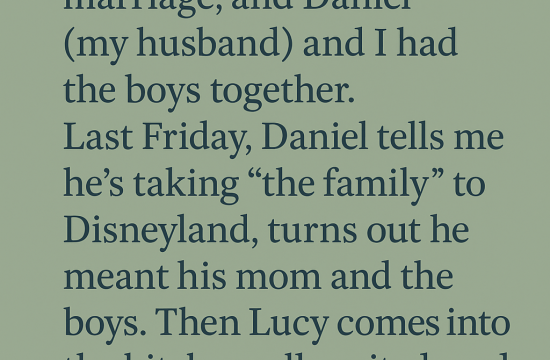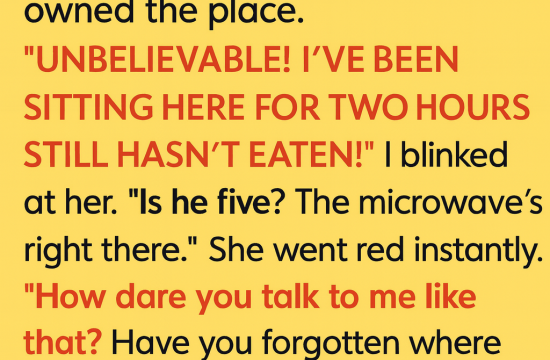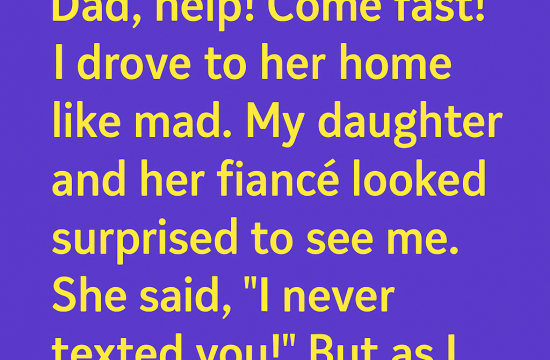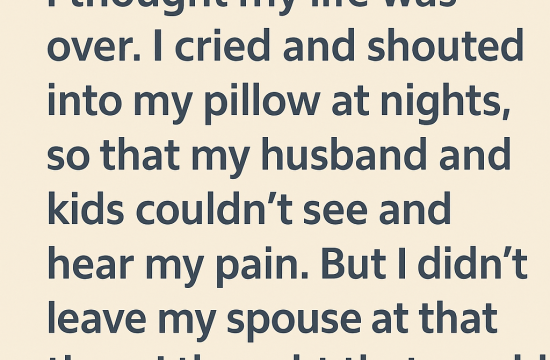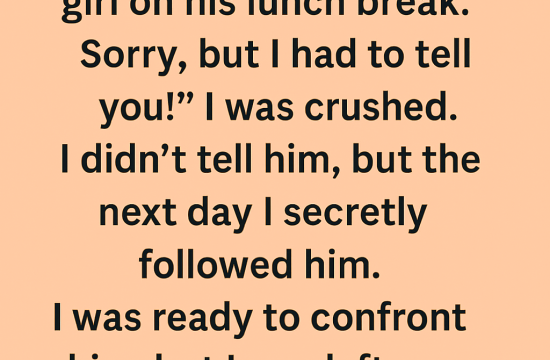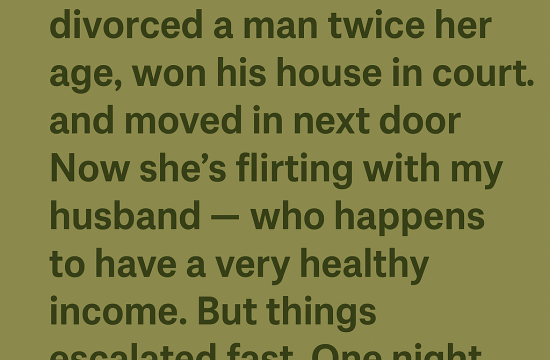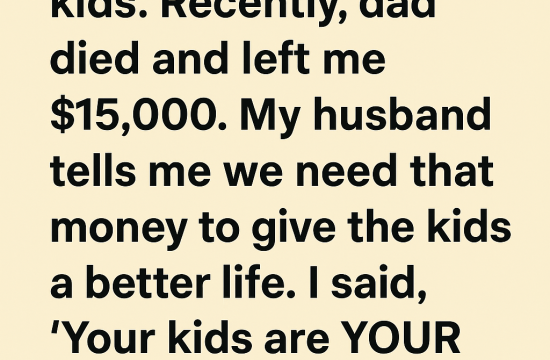On my birthday, my husband handed me a neatly wrapped box and grinned like he’d done something thoughtful. Inside was a bottle of shower gel. Not even a set—just one bottle. The scent hit me first: cloying, artificial vanilla, the very fragrance I’d told him made me nauseous.
We weren’t struggling. In fact, I’d spent the past year making sure we weren’t. I handled invoices, chased late payments, negotiated with suppliers, and kept his small business afloat when two big clients bailed. If he’d brought me a single daisy from the corner stall, I would’ve smiled. But this? It felt careless, like he’d grabbed the first thing near a cashier and thought, “Good enough.”
I didn’t show it. I thanked him, tucked the box under the sink, and made us dinner. After he fell asleep, I stared at that bottle until the label blurred. The hurt wasn’t about money—it was about being known. He knew I hated that smell. I’d said it a dozen times. The smallness of the gift wasn’t the problem; the smallness of the attention was. I cried, opened the cap, and poured the gel into the toilet. Watching it spiral away felt like letting a quiet anger drain with it.
The next morning he bounced into the kitchen, kissed my cheek, and asked, “Did you open it?”
I lied. “Not yet. I’m saving it.”
“Okay,” he said, oddly pleased, like there were points to be earned later. He left for work humming.
That afternoon, I did what I always do: balanced the books. I needed a receipt that hadn’t uploaded from his work card. He’d left his car keys on the hall table. In the glove compartment was the company envelope with the missing paperwork—and one crumpled slip from a luxury boutique, dated two days before my birthday. A single line item caught my eye:
Eau de Parfum—Vanille Noire (Gift), Shower Gel—Complimentary.
I read it twice. Complimentary. So the gel wasn’t even bought for me. It was a freebie attached to a perfume. I flipped the receipt over. A handwritten note was scrawled in looping letters: “For L—Happy weekend. —M.”
L.
My stomach went cold. His assistant’s name is Lara. The boutique’s logo glittered at the top. I could picture the sleek black bottles lined up on gold shelves, the sales associate’s immaculate smile. The same sickly vanilla scent clung to his jacket that night—the jacket he’d worn to “a late client dinner.”
I wasn’t proud of what I did next, but I was past pride. I drove to the boutique.
The place smelled like money and sugar. A woman in red lipstick welcomed me by name after glancing at the receipt. “Yes, we remember him. He purchased the Vanille Noire as a gift. We added a complimentary shower gel and wrapped both separately.” She smiled wider. “He asked for the perfume to be engraved with an initial. L.”
My hands were steady when I left; everything else wasn’t. In the parking lot, I sat with the engine off, listening to my own breathing. There are moments when your mind tries to bargain and soften the edges—maybe it was for his mother, maybe for a client, maybe I was overreacting—but the engraved initial sliced through every soft thought.
I stopped bargaining.
That evening, he walked in with takeout and roses. “For my birthday girl,” he said, as if the day hadn’t already cracked. He put the flowers into my clean mixing bowl and reached for the bottle under the sink. “Want to try your gel tonight?” he asked, half teasing, half testing.
“I poured it out,” I said. “Also, how’s Lara?”
He froze. “What?”
I placed the receipt on the counter between us like a witness. “If you wanted to give your assistant perfume, you could’ve at least not gifted me the free shower gel from the same line. And you could’ve remembered I can’t stand that scent.”
Color slid from his face. He looked at the receipt, then at me, and tried on a dozen expressions—surprised, offended, wounded—before settling on weary. “It’s not what you think,” he said, brittle.
“That line should come engraved too,” I said. “Try again.”
Silence pressed into the kitchen. He deflated. “It was one dinner that turned into a… mistake,” he said finally. “I didn’t plan it. It just… happened.”
“It never just happens,” I said. “Affairs don’t fall from the sky. You walk toward them. You make a hundred small choices before you make the big one.”
He rubbed his hands over his face. “I was stressed. You were always at the shop or with spreadsheets. I felt like I didn’t exist at home. She… made me feel seen.”
The irony almost made me laugh. I’d felt invisible for months; he’d felt ignored for weeks. I’d been keeping us afloat while he set himself adrift.
“What happens now?” he asked, small.
“Now,” I said, “I stop pretending I’m fine with crumbs.”
That night I packed a suitcase—not to flee, but to leave for a while. I booked a room near my sister’s and wrote down three conditions if he wanted a sliver of a path back: he would end all contact with Lara immediately; he would start therapy—alone first, then with me if I chose; and he would move out for a month so we could both see our lives clearly. I printed the conditions and left them on the table with the receipt.
He called. He cried. He swore. He agreed to everything and sent a screenshot of a termination letter. I didn’t take his word for it; I called HR. It was messy and unromantic, and that’s how truth usually is.
While he moved into a short-term rental, I rearranged my life without him at the center. I took back the parts I’d handed over by habit: I hired a part-time bookkeeper instead of “doing it all.” I joined a ceramics class I’d bookmarked for a year. I filled a wide glass vase with tulips I bought for myself, dead center on the table.
Two weeks later, he sent a photo from a therapist’s waiting room. Then one from a group session for accountability. He wrote long emails instead of short apologies. He didn’t demand timelines or forgiveness like a bill that was past due; he understood he’d defaulted on something larger than a marriage license—my trust.
I didn’t rush. Some days I read his messages and felt my throat soften; other days I reread the receipt and went stone-cold again. Healing, I learned, isn’t a straight line; it’s a spiral—you pass the same hurt from a higher vantage point.
On what would’ve been our quiet Friday date night, he stood on the porch with a small box—not glossy, not from a boutique. Inside was a single gold charm: a tiny tulip. “I’m not asking you to come back,” he said. “I’m asking if I can keep showing up, even if you never do.”
I looked at the flowers on my table, at the woman I’d started to recognize again. In the end, my answer wasn’t a dramatic speech—it was a boundary. “Keep doing your work,” I said. “I’ll keep doing mine. If, months from now, we both still want this, we’ll meet at a counselor’s office and decide together. Until then, we’re separate.”
He nodded. For once, he didn’t try to turn a gesture into a shortcut.
This isn’t the kind of story that ends with a grand airport chase or a sudden happily-ever-after. It ends—today—with a woman who stopped measuring love in apologies and started measuring it in consistency. It begins—again—with a vase of tulips I bought for myself and the quiet recognition that I am not difficult to love; I am difficult to take for granted.
The shower gel taught me that.
And I kept the empty cap in the drawer—not as a wound, but as a reminder: never accept the freebie when you’re worthy of the real thing.
Ayera Bint‑e has quickly established herself as one of the most compelling voices at USA Popular News. Known for her vivid storytelling and deep insight into human emotions, she crafts narratives that resonate far beyond the page.




